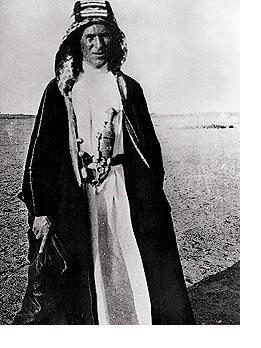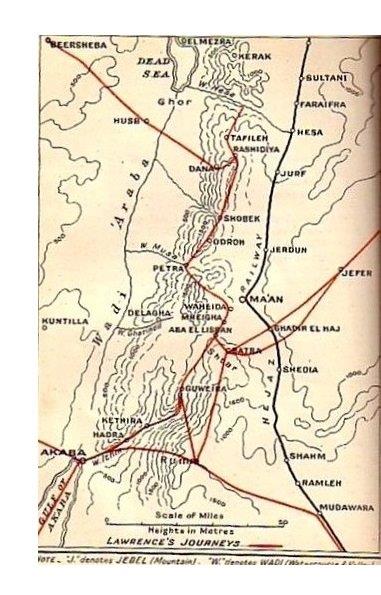February 2014 - Lawrence Drinking Coffee Under Fire
 |
|
T.E. Lawrence – Drinking Coffee Under Fire
 He crept, in the dark, alongside the railway, searching for the Garland mine he had planted earlier, when it was still light. The mine had failed to detonate under the last train. He meant to do this job alone because it was dicey work feeling for the hair-trigger buried in the ballast. The Turks themselves had carefully inspected this section of line earlier in the daylight and had not found the explosives. But the Juheina tribesmen apparently were just as interested as he in determining the reasons the mine failed to explode. They mingled about the rails, curious, watching him search. The mine, if detonated now, would not only destroy about 70 yards of track, but would certainly kill them all.
He crept, in the dark, alongside the railway, searching for the Garland mine he had planted earlier, when it was still light. The mine had failed to detonate under the last train. He meant to do this job alone because it was dicey work feeling for the hair-trigger buried in the ballast. The Turks themselves had carefully inspected this section of line earlier in the daylight and had not found the explosives. But the Juheina tribesmen apparently were just as interested as he in determining the reasons the mine failed to explode. They mingled about the rails, curious, watching him search. The mine, if detonated now, would not only destroy about 70 yards of track, but would certainly kill them all.He finally located the detonator, the trigger pressed in slightly, but the earth, soft from the earlier storm, had given way under the plate, preventing the trigger from fully depressing.
So we find T.E. Lawrence, journeying with Arab nationalists up hills, across dunes, through wadis and over deserts harassing the Hejaz Railway, delaying Turkish supplies to Medina, and generally costing the Ottomans much time, money, and uncertainty regarding the safety of the rail line. After this particular raid Lawrence returned to Wehj sick with dysentery, and, while recovering, developed the next action, to take Port of Aqaba from the east.
Lawrence and his Arab guerillas blew up several trains as they journeyed north by northeast, in the general direction of Damascus, so that the Turks realized too late the intent of his group, led by the famous, and notorious, Aouda Abu Tayi. Lawrence was technically just an advisor, but through his influence, enhanced by his strategic thinking and personal bravery, made him a leader as well. He played a double game, encouraging and abetting the Arab revolt against their Ottoman rulers, but coordinating his strategies with the British goals of rolling back the Turks, who with their German and Austrian allies, threatened access to the Suez Canal and the Basra oil fields.
Lawrence’s account of his adventures during the Arab Revolt is splendidly told in “Seven Pillars of Wisdom”. He not only was an intrepid soldier and leader, but an exceptional writer. The miles he covered and privations he endured are told with vivid descriptions of the countryside, the men, and the camels that carried them. The harsh landscape, with its ancient lava flows, gorges, oases, thorny trees, and changing terrain, sometimes flinty with hard rock, sometimes soft dunes that swallow the camels legs, are compelling described.
 The culture of his nomadic hosts is described in the same vivid detail as the landscapes, as he enjoys occasional feasts of lamb, oryx, gazelles, and, when times were difficult, camel, under the goat-hair tents. He discusses the politics, tribal rivalries, and illustrates the men, both their physical aspects and their characters, with verve. The Arabs are described as very tough, almost as able to endure days without food or water as their camels. While thousands of Arabs were involved in the revolt, most tribes only fought in their own territories, as interested in war booty and British gold as the Arab cause.
The culture of his nomadic hosts is described in the same vivid detail as the landscapes, as he enjoys occasional feasts of lamb, oryx, gazelles, and, when times were difficult, camel, under the goat-hair tents. He discusses the politics, tribal rivalries, and illustrates the men, both their physical aspects and their characters, with verve. The Arabs are described as very tough, almost as able to endure days without food or water as their camels. While thousands of Arabs were involved in the revolt, most tribes only fought in their own territories, as interested in war booty and British gold as the Arab cause.On their journey to Aqaba he describes taking coffee with his companions. They drank a fair amount of coffee and tea, but, of course, we were most interested in coffee-making in the desert:
“While we talked the roasted coffee was dropped with three grains of cardamom into the mortar. Abdulla brayed it; with the dring-drang, dring drang pestle strokes of village Nejd, two equal pairs of legato beats. Mohammed el Dheilan heard, came silently across the sand and sank down, slowly, groaningly, camel-like on the ground by me….
The hazardous goal was in our thoughts, day and night; consciously and unconsciously we were training ourselves, reducing our wills to the single purpose which oftenest engrossed these odd moments of talk about an evening fire. And we were so musing while the coffee-maker boiled up his coffee, tapped it down again, made a palm-fibre mat to strain it before he poured (grounds in the cup were evil manners), when there came a volley from the shadowy dunes east of us and one of the Ageyl toppled forward into the centre of the firelit circle with a screech.”
“Seven Pillars of Wisdom” was considered by Churchill as “one of the seven greatest books ever written in the English language”. And while Lawrence’s tactics are still studied at West Point, the story is one of the greatest war adventures ever recounted. A fine book to read while enjoying a delicious cup of J. Martinez & Company coffee!


